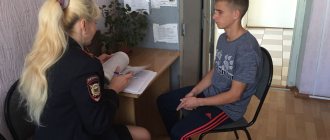Every year, the level of child crime increases, and not only in our country - throughout the world. Often, when examining the personality of an adult defendant, the court finds out that even as a teenager, this person was already registered with law enforcement agencies as a violator.
At the same time, it is believed that the “police children’s room,” as the specialized department for working with children was previously called, prevents the growth of child crime. Is it really? When can minor children be registered with the PDN and how can they appeal against police actions if such actions are clearly unfounded? Read in this article.
What is a police nursery?
Initially, there was a more severe punishment for violation. The first department for working with juvenile offenders was founded in 1918. The separate police room began its activities in 1930. The rooms were created in the water management departments of cities and villages.
This department is aimed at working with difficult teenagers who have committed an administrative or criminal offense, but due to their age cannot be held responsible for themselves.
Violators are monitored, assistance with employment, and moral education for minors is provided . In addition, work is carried out with children who have gotten lost or fallen behind their parents, but have not committed any offense.
What is the name now?
After changing the names of the police to the police, this department also changed its name - the police children's room. But many employees continue to use the old name.
Saving love
Unfortunately, no one is immune from unfavorable circumstances, and parents of teenagers simply need to know such contacts as the address and telephone number of the PDN department. Just as many years ago there was a phone number for the children's police room, now every city and district has its own contact for the PDN service, which can be found out by contacting the nearby police department.
But prevention is still better than correction. To prevent your child from getting into an unpleasant situation, try to communicate with him more, take an interest in his life and surroundings. Ask yourself the question more often: what is my child doing now, where is he and who is he with? This does not mean taking the child’s life under strict control, but the main preventive measure will be parental love and attentive attitude towards their child.
Which teenagers are subject to registration?
Police officers supervise teenagers who are under 18 years of age. Responsibility for offenses begins at the age of 16, but in some cases a 14-year-old teenager can also receive punishment. Particular attention is paid to dysfunctional families where parents abuse alcohol or drugs. Because of this, teachers of teenagers need to monitor children from such families.
If any offense is recorded at school or a teacher notices a child smoking, drinking alcohol, or bruises appearing on the student’s body, then you should immediately contact the police or the department for working with minors. Teachers also have the right to contact the guardianship authorities.
The following offenses committed by minors are monitored:
- who has been observed engaging in hooligan behavior in a public place, being intoxicated, drinking alcohol in a public place, being in a drug state, fighting and attacking others, damaging someone else's property or property belonging to city authorities, damaging cultural monuments;
- teenagers taking drugs and psychotropic substances without prescription from a medical specialist;
- teenagers who left special institutions without permission: orphanages, rehabilitation centers, special schools;
- minors involved in the distribution of drugs and inciting other teenagers to use drugs;
- if the offender has a developmental disability and cannot be held responsible for his own actions;
- teenagers who received a suspended sentence in the form of community service;
- minors who have been released on parole or pardoned.
It is important to remember that even a seven-year-old child who has run away from his parents or guardians, provided that he is caught for an administrative violation, is registered with the department for working with minors. In addition to monitoring teenagers, department employees monitor the family of the offender. The most common age of offenders is from 13 to 15 years.
Registration of a used car with storage of license plates
Since the entry into force of the new regulations (October, 2013), simplified methods have become available to motorists for registering vehicles with the State Traffic Safety Inspectorate, including the ability to register a used car without changing license plates.
Now, in order to sell a car, it is not necessary to deregister it; it is enough to correctly draw up and fill out a car purchase and sale agreement. When the new owner contacts the traffic police regarding the registration of a newly purchased car, the previous owner will be deregistered automatically.
The buyer will also not have to pay for new numbers and the total cost of registration will be reduced from 2850 to 850 rubles. The legal basis for re-registration of a car is a purchase and sale agreement.
To protect yourself from unpleasant situations that often occur during the simplified sale of a car, you need to make sure that the new owner has re-registered the car with the traffic police in his name. Otherwise, fines and other traffic violations, including criminal ones, will be charged to the previous car owner.
We cannot ignore the opportunity to register a car in any region, regardless of place of registration. This amendment actually removes many restrictions
For example, having bought a car from a Moscow car dealer, you can safely return home with license plates from the capital region.
Especially for particularly enterprising citizens, we note that there is no opportunity to save money here, since the car is somehow attached to the home region. But there are many other advantages, including the opportunity to get a duplicate of plates stolen or lost along the way by contacting the local traffic police.
What is the registration procedure?
The registration procedure requires official registration. This procedure is carried out not only by police officers, but also by the juvenile affairs commission of the city or district in which the minor committed the offense.
General registration procedure:
- Recording the fact of violation by a minor by drawing up a protocol, which is sent to the parents or legal representatives of the child.
- Within three days, the protocol is transferred to the commission supervising offenders.
- After the commission’s decision, it is determined whether preventive registration is required for the offender and his parents; the commission’s decision can be appealed if there are compelling reasons.
- Submitting a report on the commission of a crime and a decision on imposing punishment on the offender to the head of the city or district police department.
- Document on registration in the PDN.
As documents are compiled, information about the child and his family is collected, and the offender’s relatives who are already registered are checked. The guardianship authorities are also notified about the violator and his family.
Guardianship authorities are also involved in the registration procedure: they check the living conditions of the teenager, the state of his family, and collect characteristics from school and neighbors. An appeal against a registration decision is possible within 10 days after its adoption and receipt of notification. Parents or official representatives must send their complaint to the CND, after which the application is sent to the court.
How do you work with difficult children?
The process of working with difficult teenagers includes several activities aimed primarily at helping the child. Measures are taken not only by the commission’s staff, but also by the juvenile affairs inspector. Separate work is carried out by psychologists, narcologists, social educators, and local police officers.
The main impacts on minors are:
- observation and control of the child and his behavior at home, at school and in sections, if the child attends them;
- visiting the places of residence of problem teenagers, conducting conversations with his parents, teachers: if any violations are identified in relation to the upbringing of a teenager, parental rights will be limited, information will be sent to the prosecutor’s office;
- drawing up an inspection report on the living conditions in which the child lives: whether his parents provide him with everything necessary for study, recreation and leisure in his free time;
- if it is revealed that parents are unable to provide proper attention to their child, and a simple educational institution is unsuitable for educating a difficult teenager, then the commission sends him to special educational institutions that provide education for problem children;
- if all of the above measures do not have the desired effect, then there is a risk of placing the child in a temporary isolation center for minors.
History of creation
In the last century, our country has experienced a lot of upheavals. The First World War, revolution and civil war, subsequent NEP, industrialization, collectivization and, of course, the Great Patriotic War. All these disasters had a negative impact on the well-being of society, many children became orphans. The city streets were full of street children and juvenile thieves. The Soviet authorities have been puzzled by the growing problem of difficult teenagers since the late 20s.
According to the Decree of the People's Commissar of the USSR of 1935, special detention rooms for detained street children were established in the country, within the structure of the existing police. And at the end of 1940, on the basis of these rooms, the first children's police rooms were created. The problem with child crime worsens during the difficult war years; children's departments and departments of colonies appear in the structure of the Ministry of Internal Affairs.
By the 1950s, when attention began to be paid to the personality of the teenager, the colony departments were eliminated and the work of children's police rooms was resumed. Institutions of this type changed their name several times - in 1977 they began to be called juvenile affairs inspectorates, and since 1993 - departments for the prevention of juvenile delinquency.
What is CVINP?
A temporary detention center for juvenile offenders should not be confused with a temporary detention center for adult offenders. This is a closed institution, which is an educational institution. Offenders who have committed:
- Unlawful administrative violations.
- Those violations that provide for criminal liability upon reaching the age of 18 years.
- Escape from educational institutions, shelters, special schools.
In addition, teenagers are sent there:
- without identifying the minor;
- if there is no information about place of residence and parents;
- who are awaiting a verdict in their case.
At the center, teenagers are given educational talks, sent to community service, and psychologists and narcologists conduct sessions. There are also situations in which the head of the internal affairs department carries out the referral of a teenager to the Center for Internal Affairs, after notifying the prosecutor’s office. But only on the condition that the teenager’s stay does not exceed two days.
What consequences can registration have?
Preventive registration does not impose certain restrictions on the child. But if violations are committed systematically, or the severity of the violation is more serious than smoking in a public place, then this also threatens the child’s future.
In addition to the stigma of the offender and the biased attitude of teachers towards the teenager, employees are required to visit the minor’s family monthly in accordance with Order No. 845 and Article 91 of the Criminal Code of the Russian Federation.
Main consequences:
- Characteristics will not provide an opportunity to enter elite educational institutions after graduation, especially law school and military institutions.
- Even minor violations related to drug possession and theft are an obstacle to the possibility of serving in law enforcement agencies.
- It causes the child to feel inferior, develop complexes, withdraw from parents and, as a result, further problems with school and relationships with peers.
- Negative state of mind, risk of association with bad company.
- If information about past offenses gets to the employer, there is a risk of being left without a decent job.
Is it possible to avoid registering a minor?
If a child has committed an offense, but the parents wish to appeal the registration, they must:
- come to the hearing of a case of a committed offense in person;
- provide the commission with all the necessary evidence of the child’s good behavior: information from school, characteristics from neighbors, characteristics from the coach and from club teachers;
- assure the commission that the child made a mistake, and the parent will do everything possible to help the minor prevent possible repetitions of violations;
It is worth remembering that commission employees and juvenile affairs inspectors are fair and will not register a child if there is no reason to do so. If the minor has already been registered, then the parents can appeal the decision within 10 days from the date of receipt of the decision. The application should be sent to the court station with all the documents.
If registration was carried out and the commission did not listen to the parents’ arguments, the parents have the right, after six months, to send a request for deregistration. The application is written in free form, but it is worth indicating the grounds and supplementing with evidence under which the child can be removed from the register. You can count on this if the child’s behavior has improved, offenses are no longer noticed, and the teenager’s academic performance has also improved. If the juvenile affairs inspector himself is convinced of the worthy behavior of the offender, then the question of removing him from the register can be raised by the PDN officer himself.
In addition, deregistration occurs:
- Upon reaching adulthood.
- The suspended sentence has expired.
PDN assistants
Of course, the effective work of the PDN is impossible without close relationships with schools, preschool institutions and various public structures. Concerned citizens, especially those of retirement age, provide great assistance to the PDN authorities. They willy-nilly witness the lives of dysfunctional families and can provide informational assistance.
Before reaching adulthood, difficult teenagers receive assistance from the PDN in every possible way. If necessary, they can be sent to orphanages and other government institutions, and they can also assist in finding a job if the child has stopped studying.
Reasons why a child may be registered with the CDN
In accordance with Article 5.35 of the Code of Administrative Offenses of the Russian Federation, teenagers who:
| Did not find an answer to your question? Call a lawyer! Moscow: +7 (499) 755-83-41 St. Petersburg: +7 (812) 917-23-31 |
- have not yet turned 18 years of age;
- if the parents were deprived of parental rights, but returned them and are trying to correct the situation;
- if parents do not fulfill their duties;
- incited children to commit crimes;
- if the parents abused alcohol or drugs;
- in addition, the reason is administrative offenses and criminal offenses if the offender cannot bear full punishment due to his age.






